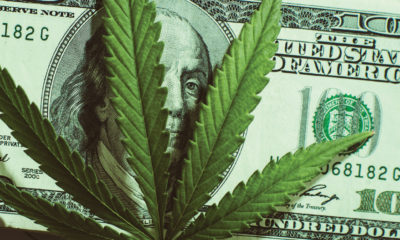As the first U.S. state to legalize medical cannabis and the largest for potential sales, California has been falling behind other states in one crucial area… making it profitable for cultivators and businesses. Even four years after adopting recreational cannabis sales, California’s market has grown to just one-third of its expected size.
A new study published by the Reason Foundation, a libertarian research group, targets California’s high taxes for lagging sales. The report estimates that nearly two-thirds of cannabis transactions are still taking place on the illicit market. According to Statista – a provider of market and consumer data – sales in black market cannabis reached approximately $8.7 billion in California in 2019. The legal cannabis market took in sales of only $3.1 billion that same year.
“We are experiencing first-hand a serious price compression in the California supply-chain in part as a result of the illegal market, high taxes and fees and a patchwork of inconsistent local taxes driving legal operators to the brink of a financial cliff,” said Amy O’Gorman Jenkins, president of Precision Advocacy, one of the study’s authors and lobbyist for the California Cannabis Industry Association. “We cannot allow the largest cannabis market in the world to fail.”

This illegal indoor-grow facility of 18,690 cannabis plants in Weitchpec, CA was seized by the Humboldt County Sheriff’s Office Marijuana Enforcement Team in 2020. PHOTO: HUMBOLDT COUNTY SHERIFF’S OFFICE
Cultivators see the seed of ruin
The report, also co-authored by Good Farmers Great Neighbors, a California alliance of cannabis farmers and businesses, claims California could increase legal sales and bring in 123% more in monthly tax revenue by 2024 by eliminating its hotly debated cultivation tax. The state’s cultivation tax is widely seen as make-or-break situation by many growers.
“California’s cannabis farmers are experiencing the biggest challenges of their time. Many farmers are considering going fallow this year. Busy Bee Organics, one of the first woman-owned, sun-grown farmers in Santa Barbara, has already declared she’s not planting this year,” said Sam Rodriguez, policy director of Good Farmers Great Neighbors. “California’s cultivation tax is regressive and has only contributed to uncertainty about the future of the state’s cannabis farmland economy and whether it can survive.”
Advertisement
The Reason Foundation points to cultivation taxes– as high as $1,441 per pound – as the major constriction on California’s cannabis market. By comparison, cannabis taxes average just $340 per pound in Oregon and $526 a pound in Colorado. Due to lower taxes and greater access to legal products, residents in Oregon spend 378% more per capita on legal cannabis and residents of Colorado spend 335% more per capita on legal cannabis than Californians, the report said.
“High taxes are undermining California’s legal cannabis market,” said Geoffrey Lawrence, director of drug policy at Reason Foundation. “Without the cultivation tax, our data show lower cannabis prices would increase sales of legal products, increasing the state government’s general sales tax revenue and more than replacing losses from the eliminated cultivation tax.”
Less licenses mean more back alleys
The study also recommends reducing retail excise taxes and encouraging policies that could incentivize California’s local governments to stop banning the sale of legal cannabis products. Stores selling cannabis for recreational purposes have been banned from 80% of the 482 municipalities in California. Oregon has one legal cannabis retailer for every 6,145 residents and Colorado has one legal retailer for every 13,838 residents while California has just one legal cannabis retailer for every 29,292 residents, the study found.
Moreover, the authors of the report note public safety as another reason the state should consider tax reductions. Transactions on the illegal market are unregulated, fraught with risk and illegal products are untested and may be contaminated. In the drought-stricken state, illegal water diversions and polluted water runoff from illicit farming operations further endanger public safety. Yet, despite these perils, high taxes combined with a paucity of legal retailers are encouraging more Californians to turn to the street rather than legal channels for their cannabis, according to the report.
 Earning a California cannabis tax stamp as a state seal of approval can cost cultivators up to $90 an ounce. PHOTO STATE OF CALIFORNIA
Earning a California cannabis tax stamp as a state seal of approval can cost cultivators up to $90 an ounce. PHOTO STATE OF CALIFORNIA

 Cover Features11 months ago
Cover Features11 months ago
 Cover Features11 months ago
Cover Features11 months ago
 Legal9 months ago
Legal9 months ago
 Branding10 months ago
Branding10 months ago
 Products9 months ago
Products9 months ago
 Branding12 months ago
Branding12 months ago
 Business12 months ago
Business12 months ago
 Podcasts11 months ago
Podcasts11 months ago















